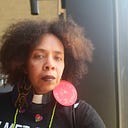#TreasuresofDarkness, Day 4 Jude 1:12–13
Routinely throughout this month you will see this gif:
This is valid and vital in African Descent communities to be spoken into existence over and again because, and especially in spaces of no hope i.e. mass incarceration and police brutality against black bodies; those who are imprisoned because of the law and no mercy or grace in the US prison system are told routinely that they are now unforgivable and forgotten and disregarded by the world outside those cells and walls-especially by the faith community.
This is validated when people return from the hell of incarceration and are marked by the community and the church as sinners, that have no redeeming qualities and need to be reminded every waking moment of how ugly their souls are. So why are we surprised that they then return to the streets when we rejected them by removing the same love that is given to us each moment from the Creator? If, as peoples of the African Diaspora we understand our original cosmology through West African religious and spiritual traditions, that we are to be practicing and ethnically bound to be in harmony with one another and with Creation, why have we taken on the mask and identity of the oppressor?
Why are we constantly critical in unhealthy ways of one another, which are not life affirming?
Why do we find ourselves jealous to the point that we are quick to cut one another down?
Why, do we take on the identity, the ideology and the doctrines of the oppressors?
Instead,
let’s root for everyone Black,
every
single
waking
moment.
Without further ado, the Day 4 devotional post from my dear friend, colleague and phenominal up and coming Womanist Ethicist, Denise Rector:
Darkness. Chaos. Mystery. Ignorance. Supernatural events. Distress. The Unknown-with-a-capital-U.
Let’s posit that darkness is shorthand for the things humanity is afraid of. Darkness is a shorthand for the things contained in the Tree of the Knowledge of Good and Evil. And remember, we reached for that tree pretty much the second God turned God’s back.
If we were not afraid of these things that we term darkness, would we still be human? Is that why we created superheroes, because superheroes are not afraid of these things?
I am using the word things repetitively on purpose.
We are human. We are afraid of things. The problem comes when we apply this objectified fear to people.
People are not things.
What did Jude (traditionally believed to either be a brother of Jesus, or a later writer who chose to identify himself with the brother of Jesus), learn from Jesus about the Othered? About the..
Outcast,
The prostitute,
The leper
The Samaritan?
Were these people objectified re-conceptualized as “things,” so the privileged could project their fear of “dark things” onto them?
What have we learned from Jesus about the Othered?
Jude says that heretics are in darkness, and deserve eternal darkness. Conversely, Jesus ate with, healed, and fed outsiders — Jesus didn’t participate in their objectification.
Jesus is, has always been, large enough for us to depend on as we recognize, confess, and release our deepest fears. Jesus did not come to allow you or me to project my fears onto my fellow humans. Jesus came to redeem us from this sin.
So what it is about protecting the status quo — about affirming ourselves! — that moves us away from identification with our fellow humans and reaching out to them in charity … and moves us toward objectifying, and othering, and projecting the concept of darkness onto them?
Denise Rector (M.Div, Wartburg Seminary) is a current Ph.D student andn scholar at the Lutheran School of Theology, Chicago focused on ethics and Womanist Theology.. Denise has also received an FTE Doctoral Scholarship and is one of the FTE Fellows for 2019–2020.
